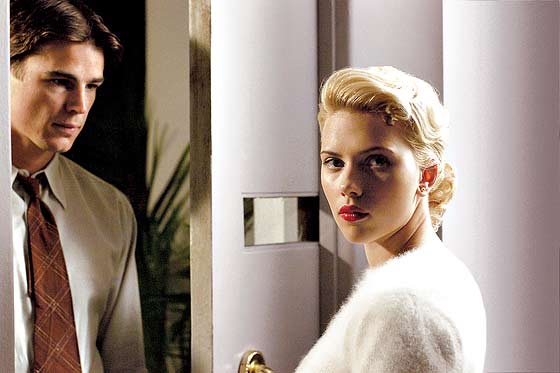
In prospect, The Black Dahlia is a disturbingly perfect marriage of filmmaker and subject: Brian De Palma, the virtuosic director who raised feminist hackles with the elaborate murders in Dressed to Kill and Body Double, and Elizabeth Short, the aspiring movie star and barfly found in 1947 in a vacant Hollywood lot, her body cut in half, her innards removed, a hideous smile carved from ear to ear on her broken face. I can already hear the cries of outrage: Who let this ghoul near the Dahlia?
The charges of misogyny against De Palma have always struck me as unjust. Well, okay, Body Double was a big “Suck on this” to feminists, but the film that first inspired their wrath, Dressed to Kill, was a nightmarish fantasia on the desire to punish women, not a manifestation of that desire. De Palma’s females—from Carrie White to the Femme Fatale babes—tend to be more sympathetic than his males. No film demonstrates De Palma’s understanding of the male gaze and its pinned-and-wriggling quarry more than his neglected 1989 masterpiece, Casualties of War, a clear-eyed anatomization of a real-life atrocity, the rape and murder of a Vietnamese girl. (It’s the otherworldly image of that girl that came to mind when I heard about the soldiers accused of a similar crime in Iraq.)
De Palma is a kindred spirit to James Ellroy, the traumatized romantic who wrote the novel—a fictionalized re-creation of the case—on which The Black Dahlia is based. Ellroy’s book turns on a young cop’s obsession with the Dahlia and a tantalizing Dahlia look-alike named Madeleine. Very Vertigo, but with one more angle: While the cop explores the darker sides of his sexuality with Madeleine, he pines for his partner’s girlfriend, Kay, who carries gruesome scars from her ex-lover’s savage beatings. As in Ellroy’s L.A. Confidential, there’s a double thrust here: a fascination with brutality against women side by side with a fevered urge to brutalize the brutalizers.
It’s hard to predict if De Palma and his screenwriter, Josh Friedman, can iron out the knots in Ellroy’s whodunit, or if the cast—Josh Hartnett, Aaron Eckhart, Scarlett Johansson, Hilary Swank, and Mia Kirshner as Elizabeth Short—is up to the job. But no director this side of David Lynch has the potential to bring out all the meanings in the haunting image of that severed, “smiling” corpse in that empty Hollywood lot.
—The Black Dahlia, Directed by Brian De Palma, Universal Pictures; opens September 15 (R). Next: Q&A With The Good German Star Cate Blanchett
